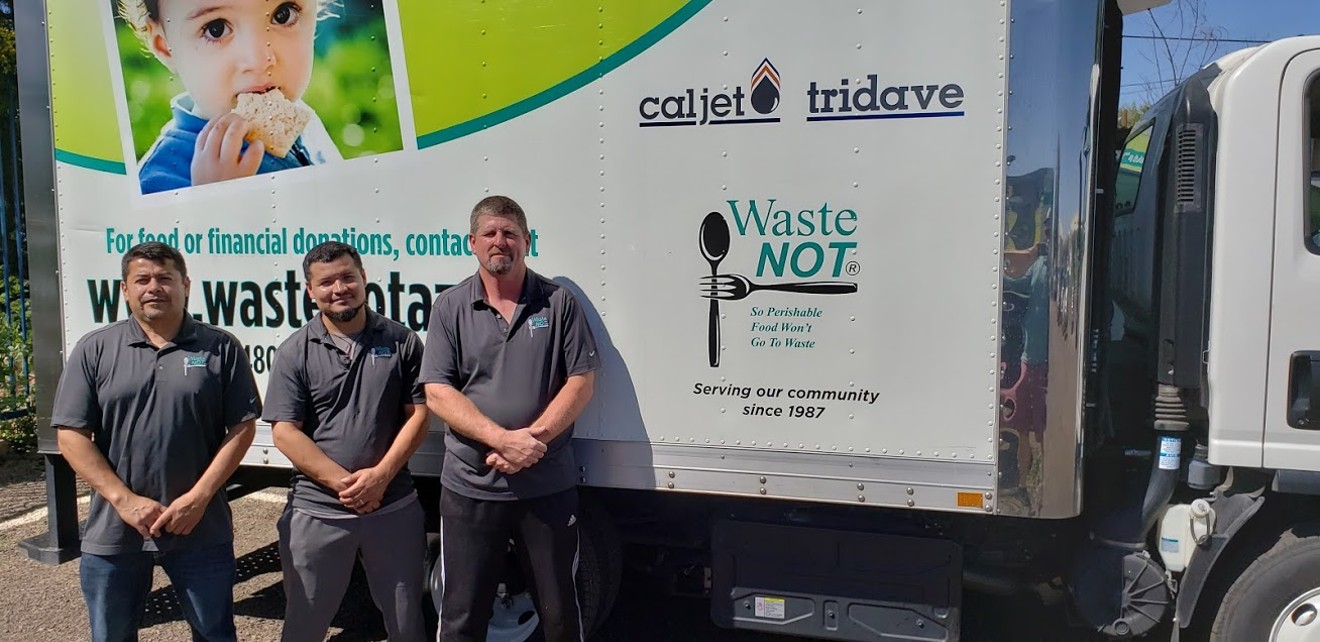Welcome to Table Scraps, an intermittent series on the growing problem of food waste and what some eateries, officials, farms, institutes, and everyday people are doing right. This isn’t a guilt trip, just a way to unpack initiatives attempting to reduce kitchen waste and food loss, as more than 40 percent of all food is wasted in the U.S. We’ll explore backyard composting to city programs, restaurant tips to technology, and anything related to this global issue. Heat up those leftovers and settle in.
Whenever I tell people I work on a food waste series, I often get this in return: "Oh, you know what would be a good idea? If restaurants and grocery stores gave their extra food to the homeless." Well, that's happening. A local nonprofit organization has been working for years to combat two major issues — hunger and food waste. It picks up unsellable food in the morning and brings it to agencies feeding those in need by the afternoon.
Sounds simple. It is, and it is not. It's Waste NOT.
Kate Thoene, who took over the role of executive director in April 2018, can take us to the beginning in 1987.
A woman in need got to the point of collecting food behind restaurants that had been tossed for her and her family. “And there was so much food that she started giving excess away to shelters and nonprofits,” Thoene says. “It was insane, the abundance of food that was being thrown away, and it just grew organically from there.”
At first, Waste NOT was absolutely focused on hunger. But more recently, it’s become equally about waste reduction. Waste NOT has become a transportation service, picking up food and delivering it to organizations feeding those in need. The staff collects large-scale food donations from restaurants, grocery stores, catering companies, and more. Think Fry's, Sprouts, and Trader Joe's. Capital City Grille. Atlasta Catering.
In 2018, Waste NOT delivered 3.5 million meals to 87 nonprofits. That means it diverted 1,750 tons of food from local landfills, equating to more than $4 million of economic value. In 2019, Waste NOT has so far recovered more than 562,000 pounds of fresh food and delivered it to local agencies.
That’s using a couple of refrigerated box trucks, and a five-person paid staff: Thoene, program director Sheila Perlman, and three drivers — Jorge Hernandez, Tim Hunt, and Jorge Vega. Thoene says they’re a small but mighty team.
“Our model is really unique and complex in a way because we don’t have a facility,” Thoene says. That’s right, there’s also no home base. The directors work out of donated offices, one out of Big Brothers Big Sisters of Central Arizona and one out of the Granite Reef Senior Center in Scottsdale.
She says though efficient, working remotely creates a lot of logistical challenges, where they really have to think through every pickup.
“Right from the delivery itself,” Thoene says. “What’s the volume, who can use it, where are we taking it?” These are the questions the team has to determine to the tee every day, because, “we’re a store-to-door operation,” she says.
Here’s how it works. Well, an example of how it works.
It's 6 a.m., and Trader Joe's has a couple of cases of strawberries that are about to "expire" (air quotes because we don't like to use that term) and must be pulled from the store. Waste NOT's delivery drivers pull up, load the cases of fruit, and head to the next stop. It continues.
By the afternoon, our little nonprofit is delivering this food directly to the agency, like a shelter or food pantry. For instance, take UMOM New Day Centers. Waste NOT drivers ring the doorbell out back, and head chef Rose Witt comes out and picks what she’ll be serving that night. If she's interested in the strawberries for say, a dessert, she claims the cases.
The trucks must be empty by the end of every day. That's because there’s no giant cooler or freezer at some warehouse, so pickups can’t wait until tomorrow. Therefore, everything is same-day delivery.
The end of the workday is made more simple thanks to their partnership with neighboring St. Vincent de Paul helps out. Waste NOT is able to park its small fleet in St. Vincent's downtown parking lot. Plus, St. Vincent has a massive urban garden, so Waste NOT is able to compost items that aren’t consumable next door. And we’re big fans of composting.
“Let’s say we get a donation of 20 cases of strawberries, and 18 cases are great,” Thoene says. “We can deliver those to our agencies and compost the remaining two cases.”
We've gone full berry.
What Waste NOT needs, preferably, are sealed containers with ingredient labels, keeping in mind that some people have allergies. That’s hard for some clients like caterers, since it’s an extra step. But Waste NOT still had a record-breaking year.
If you’re curious about the other end, the part where Waste NOT is delivering food to other nonprofit agencies that are feeding those in need, it looks like this.
“Those in need” is can be broken down by percentages. Children and families make up 32 percent; 22 percent of the recipients are experiencing homelessness. Another 10 percent each goes to people in recovery and people with mental illness.
“There’s a massive need and there’s food available,” Thoene says. “It’s a huge issue; we have a huge community.”
Thoene says one in four kids are struggling with food and security, as well as one in seven seniors. But every tax-deductible $1 donation made to Waste NOT — a 501 (c)(3) organization — gives them the ability to distribute five meals.
“Because we don’t have a lot of overhead, we can really maximize people’s donations, whether they’re interested in the landfill diversion or feeding hungry people. When $1 provides enough to feed five people, that’s a pretty good investment.”
Yes, they operate 100 percent from philanthropy.
The organization receives its financial support from three tiers: individuals, corporations and foundations, and fundraisers and special events. In 2018, its total support was $671,953, and its operating expenses were $660,300.
But the small but mighty Waste NOT team is not totally behind the scenes.
Waste NOT will host Empty Bowls 2019, partnering with the Arizona Clay Association to put on a lunch event at the Arizona Center. It’s happening from 10:30 a.m. to 2 p.m. on October 25. More details are to come.
Till then, Thoene is working on another hopefully record-breaking year. After just over 14 months in this role, she calls the job an adventure with endless potential.
“In the future, I hope that every food business knows about us,” she says. “I want to have a presence in the food community here.”
[
{
"name": "Air - MediumRectangle - Inline Content - Mobile Display Size",
"component": "18478561",
"insertPoint": "2",
"requiredCountToDisplay": "2"
},{
"name": "Editor Picks",
"component": "16759093",
"insertPoint": "4",
"requiredCountToDisplay": "1"
},{
"name": "Inline Links",
"component": "17980324",
"insertPoint": "8th",
"startingPoint": 8,
"requiredCountToDisplay": "7",
"maxInsertions": 25
},{
"name": "Air - MediumRectangle - Combo - Inline Content",
"component": "16759092",
"insertPoint": "8th",
"startingPoint": 8,
"requiredCountToDisplay": "7",
"maxInsertions": 25
},{
"name": "Inline Links",
"component": "17980324",
"insertPoint": "8th",
"startingPoint": 12,
"requiredCountToDisplay": "11",
"maxInsertions": 24
},{
"name": "Air - Leaderboard Tower - Combo - Inline Content",
"component": "16759094",
"insertPoint": "8th",
"startingPoint": 12,
"requiredCountToDisplay": "11",
"maxInsertions": 24
}
]















